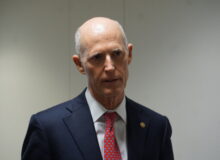(July 22) The bipartisan accord to reform the Electoral Count Act of 1887 is a laudable attempt to clarify and regularize the presidential vote-certifying process. But they haven’t quite got it yet. It still needs improvement.
While wisely eliminating all crazy notions that the vice president enjoys any discretion in counting certified electoral votes sent to Congress, the new proposal unfortunately could be misinterpreted as providing discretionary power to each state’s governor. It also contains one apparent and important self-contradiction.
The proposal represents a vast improvement over the current , convoluted, sometimes nearly inscrutable law . It removes any perceived discretion from the vice president; it would no longer allow a single rogue congressman to gum up the works with meritless objections; and it makes clear that state electors must be chosen according to state laws that were passed before the election, without allowing state legislatures any power to alter the process or standards between election and inauguration.

You can imagine, after all the grief of the post-election season in 2020, how important all of those steps are. And so even as it is now, this proposal is worth passing.
However, it should go further. Let’s focus on the possible problems and confusions that this new proposal still might create because this accord can still be improved on a bipartisan basis.
Start with this: In one paragraph, the new bill says that the state executive (governor), pursuant to existing state law, shall issue a “certificate of ascertainment of appointment of electors” that “shall be treated as conclusive.” But the very next paragraph says any such certificate that is “required to be revised by any subsequent state or federal judicial relief … shall replace and supersede any other certificates.”
By definition, that which is “conclusive” is not something that can be “revised.” The section needs an “unless” in there somewhere to indicate the governor’s certification is conclusive “unless” some duly appointed power — say, a court — overrules it. A later paragraph says, “The determination of federal courts … shall be conclusive.” If that is the intent, then the governor’s certification is not in fact conclusive, only presumptive…. [The full column is here.]






